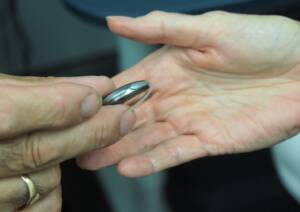How to Protect Your Hearing Aids From Winter Weather and Moisture
Winter is here, and that means the conditions could affect your hearing aids. Whether it’s hearing aids freezing or exposure to moisture, winter weather can be detrimental to your hearing assistance devices. Read on to learn some tips for caring for and protecting your hearing aids from winter weather and moisture.
How Does Cold Weather and Moisture Affect Hearing Aids?
Condensation can cause hearing aids to short out. In colder climates, hearing aid users may experience their devices getting wet from the inside as moisture accumulates in them during those cold winter months. This can lead to hearing aids that don’t work or have reduced functionality. Additionally, moving quickly between temperatures can cause moisture to form inside hearing aids, which causes hearing aid malfunctions.
How Do I Know If My Hearing Aids Have Moisture Damage?
Sound distortions are often the first sign of hearing aid moisture damage. If you’re hearing muffled or crackling sounds, then it may be time to visit a hearing audiologist for repairs. Other signs of hearing aid damage include:
- Sound cutting in and out
- Your voice is fading in and out
- Static noise
It’s also possible that your hearing aids are experiencing a technical malfunction if they stop working for a while, then start working again.
Ways to Protect Your Hearing Aids During Cold Weather
Earmuffs and headbands are a great way to protect hearing aids from cold weather. When you’re outside in the winter, wearing earmuffs or a headband will help keep your hearing aids at a comfortable temperature and prevent moisture damage.
Proper Hearing Aid Care
There are certain things you can do to take care of your hearing aids properly. Steps you can take to keep your hearing aids clean and working correctly include:
- Always wash your hands before touching your hearing aids
- Store your hearing aids in a safe, dry place away from pets and children
- When you’re not using them, turn your hearing aids off
- Regularly remove any visible earwax or debris and clean the battery contacts
- Routinely change filters or wax guards
- Clean your hearing aids as instructed by your audiologist
- Visit an experienced audiologist for professional cleanings every six months
– Never wear your hearing aids in the shower, participating in any water activities, or while using a hairdryer
It’s also a good idea to keep your ears clean. This will prevent hearing aids from accumulating dirt and debris, which could cause them to malfunction.
Fixing Broken Hearing Aids
Keep your hearing aids clean by removing hearing aid parts and cleaning them with a soft cloth. If your hearing aids break, you can visit an audiologist who can either repair them or help you choose another pair. If you’re a veteran, the VA will also replace a broken hearing aid if you’re eligible for hearing aid repairs.
Make an Appointment at Associated Hearing Professionals
If you need hearing aid repairs or just need a quick hearing test, contact the experts at Associated Hearing Professionals. With over 70 years of combined experience, our team of audiologists can help you with all your hearing needs. Call us at 314-725-2686 to schedule your appointment.

